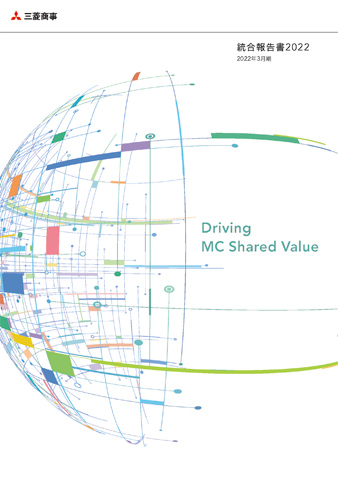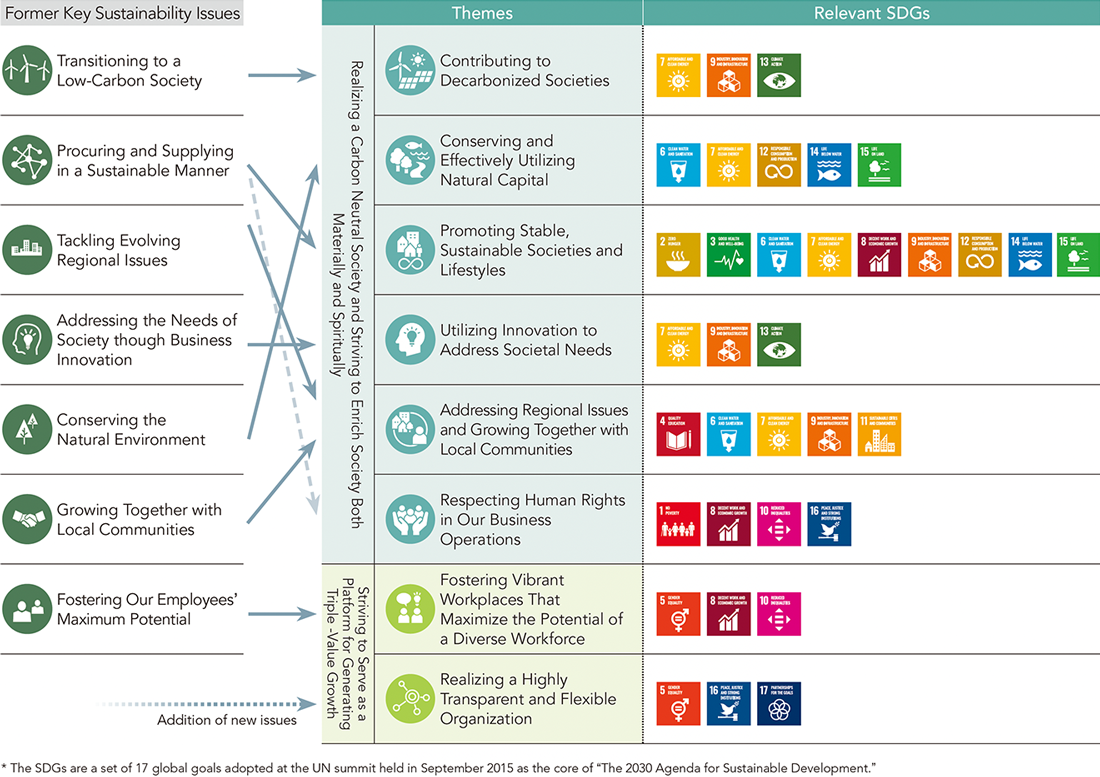Integrated Report 2022PDF List
Index
-
【Introduction】 (PDF:2.2MB)
Index/Editorial Policy/Corporate Philosophy/Message from the President and CEO (PDF:985KB)/Midterm Corporate Strategy 2024/Special Feature Creating a New Future(Fostering New Industries/Regional Revitalization)/Review of Midterm Corporate Strategy 2021
-
【The Value Creation Story】 (PDF:3MB)
Path of Value Creation/Value Creation Process/The Six Capitals/Focus Human Capital—The Source of Value Creation/Materiality/Focus Climate Change—Materiality Forming the Basis of EX Strategy/Message from the CAO (Chief Administrative Officer)/Message from the CFO
-
【Value Creation by the Business Groups】 (PDF:2.7MB)
Business Groups at a Glance/Business Groups × Business Models
-
【Initiatives and Systems Supporting Sustainable Value Creation】 (PDF:2.8MB)
Sustainability Promotion Framework/Risk Management/Corporate Governance
-
【Data Section】 (PDF:2MB)
Directors and Audit & Supervisory Board Members/Executive Officers/Shareholder Information/Organizational Structure/Global Network(Countries and Regions)/Balance of Risk Money Outstanding in 13 Countries/Financial Highlights/Equity in Earnings of Subsidiaries and Affiliates/ESG Data/Corporate Information
Materiality
We will promote initiatives based on our Materiality (material issues)
when investing the Six Capitals into business
and generating shared value through our business.
Overview of Materiality and Identification Process
Based on the Three Corporate Principles, which have served as MC’s core philosophy since its inception, MC identified a set of Key Sustainability Issues in 2016 as mileposts for proactively realizing “triple-value growth” through the simultaneous generation of economic, societal and environmental value. While responding to the requests of all stakeholders, MC has worked to address various societal issues through its business activities and has contributed towards the sustainable development of society as well as value creation.
Six years have passed since the Key Sustainability Issues were identified, and stakeholder expectations of companies regarding issues such as climate change have grown even higher, while the issues that companies must address also continue to evolve. Against this backdrop, in order to further raise our corporate value over the medium to long term, we conducted a review of our Key Sustainability Issues from the perspective of their importance to our business activities. The revised “Materiality” was announced in Midterm Corporate Strategy 2024 as a set of crucial societal issues that we will prioritize through our business activities, towards the strategy’s goal of continuous creation of MC Shared Value.
Identification Process of Materiality
-
Creating a list of potential issues
In keeping with commonly used materiality setting procedures*, MC compiled a list of around 80 potential issues that should be taken into account in order to achieve sustainable growth for the MC Group, which were based on international standards and goals such as ISO 26000 and the SDGs.
-
Gauging the importance of each issue based on internal and external perspectives
MC gauged the importance of each theme, in terms of both opportunities and risks, and selected priority issues based on the perspectives of MC’s Business Groups as well as those of external stakeholders.
- Through interviews and questionnaires with a variety of stakeholder groups, MC determined each issue’s degree of importance to stakeholders.
- Corporate Staff Section and every Business Group evaluated and prioritized each theme to determine its importance to MC.
-
Identifying the Key Sustainability Issues
MC reexamined the selected priority issues while incorporating the views of the Sustainability Advisory Committee. Following deliberations by the Executive Committee and the Board of Directors, the Key Sustainability Issues were determined.
- Harmony with local communities
- Respect for human rights
- Utilization of advanced technology
- Work environmental/ labor issues
- Pollution prevention/ countermeasures
- Effective water use
- Response to climate change
- Response to increasing food demand
- Sustainable use of resources
- Response to population fluctuations
- Expanded presence of developed countries
- Response to geopolitical risks
-
Redefining our Materiality In conjunction with the establishment of Midterm Corporate Strategy 2024, we redefined our former “Key Sustainability Issues” as “Materiality”.
- In order to strengthen our efforts to address societal issues which have becomeincreasingly important in recent years such as “respect for human rights”, “coexistence/collaboration with stakeholders”, “natural capital and biodiversity/circular economy”,“human capital and DE&I (diversity, equity and inclusion)”, and “governance”, we updated and revised the former “Key Sustainability Issues” as our new “Materiality”.
- With the aim that all employees will work together to address the eight material issues, we have divided them into the categories of “Pursuit through Business” and “Pursuit by the Organization as a whole”, which advocate the overarching concepts of “Realizing a Carbon-Neutral Society and Striving to Enrich Society Both Materially and Spiritually” and “Striving to Serve as a Platform for Generating Triple-Value Growth” respectively.
Relevance of MC’s Redefined Materiality to the SDGs
By leveraging its collective capabilities and engaging in a variety of businesses, our company will contribute to addressing a wide range of societal challenges and ensure sustainable growth. We have identified the SDGs* relevant to each material issue, and believe that promoting businesses based on our Materiality will also help to achieve the Sustainable Development Goals (SDGs).
Setting Goals for 2030
In 2019, MC formulated individual business goals so that each Business Group could autonomously promote sustainability initiatives. In 2020, MC reviewed these individual business goals to make them more specific and quantifiable, taking into account the external environment and societal demands. In 2022, these goals were aligned with the newly redefined Materiality. The main material issues and the corresponding business targets and main initiatives are as follows.
Contributing to decarbonized societies
- Promote the commercialization of CCUS and next-generation energy related projects.
- Establish ammonia fuel supply chains for power generation
- Promote initiatives around electric vessels (reducing environmental impact)
-
Aim to double renewable power generation capacity by the fiscal year ending March 2031 compared to the fiscal year ended March 2020 (from 3.3 GW to 6.6 GW).
(In addition, aim to reduce existing thermal power capacity and switch to zero-emission thermal power, targeting 100% non-fossil by 2050.)
Conserving and Effectively Utilizing Natural Capital
- Develop the recycled PET and eco-friendly material manufacturing businesses to achieve low-carbon and circular plastics
Promoting Stable, Sustainable Societies and Lifestyles
- Contribute to providing a stable supply of energy by advancing natural gas/LNG businesses.
- Reduce food waste by 50% (compared to FY2018)
Addressing Regional Issues and Growing Together with Local Communities
- Promote natural gas/LNG businesses as an effective solution to reduce air pollution and GHG emissions
- Promote initiatives around autonomous ships (reducing crew stress and maritime accidents)
- Promotion of the sharing economy through the comprehensive rental business
- Develop the Mobility Services Business
- Realize and manage valuable integrated urban development projects with accessibility and environmental friendliness















